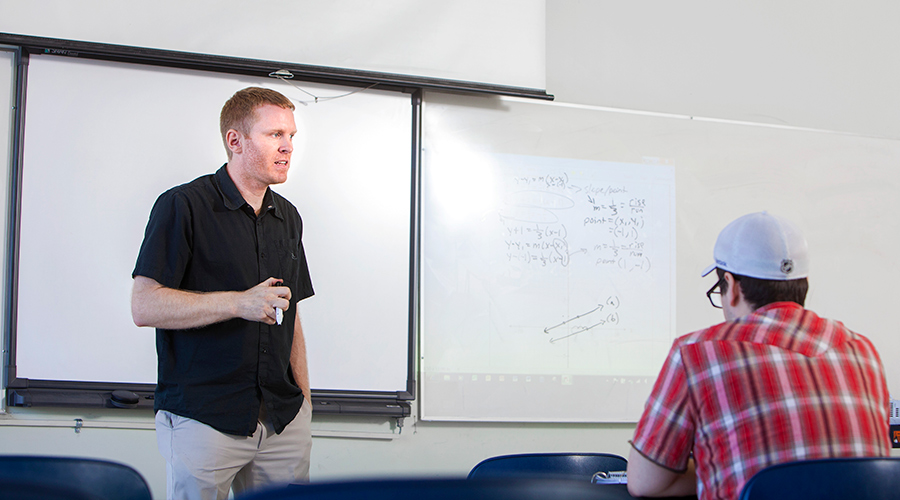Mark Schneider first at NAIT to win award
When the pandemic forced the temporary closure of post-secondary institutions in March 2020, Mark Schneider wasn’t fazed about having to pivot to virtual spaces. In fact, he embraced the challenge.
“In terms of my preparedness, I’d say that on a scale of one to 10, I was probably at a 200,” he says.
That isn’t a boast, but a reflection of how the NAIT mathematics instructor is widely recognized as an early adopter and expert in online teaching and assessment. He’s given keynotes on the subject on the international stage and shared his experiences to help his peers at NAIT prepare for the online environment amid COVID-19.
“I’m a team sport guy,” explains Schneider. “That’s really at the heart of why I entered the field of education – to work as a team.”
“That’s really at the heart of why I entered the field of education – to work as a team.”
His desire to help students, and feed off their energy as they learn and grow, has seen Schneider nominated for NAIT’s Instructional Excellence Award eight of the nine years he’s been eligible, winning twice. Now, he has a national honour to add to his collection: a 3M National Teaching Fellowship.
Schneider was one of 10 Canadians awarded the prestigious fellowships, which recognize excellence in educational leadership, teaching and innovation. “Some people consider it the Stanley Cup of post-secondary education,” he says.
Scheider is the first instructor from NAIT to ever earn such an honour – a distinction that vice-president academic and provost Dr. Sue Fitzsimmons says is a credit to his skills as a leader, innovator and “catalyst for change” across the institute.
“He’s also a deeply committed educator motivated by the belief that every student has the potential to succeed. I can think of no one more deserving of this fellowship than Mark,” she says.
“I can think of no one more deserving of this fellowship than Mark.”
We had a virtual sit down with Schneider to discuss the significance of his award for himself and for NAIT, which NAIT instructor inspired his teaching career, and the future of online education post-pandemic.

Techlifetoday
How do you feel about this recognition now that you’ve had some time for the news to sink in?
Mark Schneider
I’m a fairly quiet guy and consider myself to be rather modest. I really do feel that I’m one of amongst thousands of amazing educators across the country, so this feels incredible. It feels like I won the lottery.
You’re the first instructor from NAIT to have won this award. What does that mean to you?
I’m hoping it’s the first of many. I think we have many phenomenal educators at NAIT. We are an institution that is known by students as being the place to go to learn, but now I think it’s going to be known amongst other post-secondary institutions in other areas across the country that students want to go to NAIT because NAIT has fantastic teachers. I think the work that our teaching services does is phenomenal.
“It feels like I won the lottery.”
You were a key player in helping NAIT make the transition to virtual learning during the pandemic, including as a mentor to many fellow instructors. What was that process like?
I actually gave up my summer to work with teaching services for the sole purpose of training others and helping others gain some confidence and some traction in terms of their knowledge of the digital tools. There was an incredible amount of work that many people did to provide support over the summertime to faculty – it wasn’t just me. But what that team accomplished in teaching services as a collective over the last 12 months has been absolutely monumental.
 Where does your passion for teaching come from?
Where does your passion for teaching come from?
I did two years of mechanical engineering at the University of Alberta and was driving a broken-down car that constantly needed repairs. I was interested in rebuilding the engine on the car and learning a hands-on trade. So I came to NAIT and enrolled in an innovative [Heavy Equipment Technician] program called Think Big, spearheaded by [instructor] Bobby Haraba.
“I remember vividly thinking, I would love to do this. I would love to teach. I want to be like Bobby.”
It was one of the earliest examples of work-integrated learning at NAIT and was a bit different than a normal trade at the time. I did that for about a year and was sitting in class one day, watching Bobby teach. I remember vividly thinking, I would love to do this. I would love to teach. I want to be like Bobby. I wouldn't be where I am without him or NAIT.
What most excites you about this fellowship?
The central piece to why I'm most excited about it is because it provides an opportunity to work with the other nine fellows in the cohort across the country. It’s a chance to look at the great things that they’re doing and use some of those things in my own classroom and, hopefully, bring those ideas to NAIT.
Where does your interest in digital learning and tools come from?
I remember when I started at NAIT and a colleague dropped four giant three-inch binders on my desk – they hit the desk like bricks – and she said, “This is everything you need to teach this course.” Like, these binders were a fantastic resource, but there was no real way to search through it. The desire to bring technology into the classroom was about finding ways to reduce my own workload and finding ways to allow students to articulate their responses to questions and their learning needs in a way that makes the most sense.
How has teaching changed for the better because of the pandemic?
The one thing that's improved is access for students. Before, if a student woke up on a Tuesday morning and their kid was sick, they wouldn't be able to come to school or would be forced to make arrangements to come in, because heaven forbid if you missed four hours worth of lectures that you could never catch up on. Now, we've got faculty that are building asynchronous learning material, they're recording their synchronous material more effectively, so students now have better and ongoing access to their material.
“The one thing that’s improved is access for students.”
How do you see virtual learning evolving at NAIT or across the sector?
I do think that digital education and the transition to online is going to continue to happen exponentially. But I don't think it’s going to completely leave face-to-face education behind. I think face-to-face will always have a place at NAIT. There’s a lot to be said about watching an expert live, in person, perform a task and do something that’s going to inspire students.
Instead, what I think we're going to see is online education open up more pathways for access and better organization and just strengthen the student’s understanding of learning so that they have the opportunity to work on both.
Finally, what means more to you: a national award or the fact that your own students have nominated you almost every year for NAIT teaching awards?
On a personal standpoint, it’s the annual recognition from my students. I’m most proud of that.